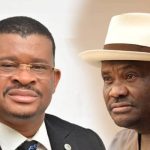The Peoples Democratic Party (PDP) and its candidate in the March 18 governorship election in Ogun State, Hon. Ladi Adebutu, are on a wild goose chase at the Ogun State Election Petitions Tribunal, as their petitions rest on inconsistencies and distortions, Governor Dapo Abiodun and the All Progressives Congress (APC) have said.
Abiodun and the Ogun State Chapter of the APC made this submission in their final written addresses as respondents in the case brought against them, arguing that the petitioners did an awful job and failed to prove their case.
This, they said, was because Adebutu and PDP presented tutored and unreliable witnesses, relied on documents that contradicted their witnesses’ case, and presented experts whose testimonies and documents lacked probative value.
They argued that Adebutu and PDP who are accused of vote buying with credible evidence, have unclean hands and could not receive equity with those unclean hands.
They further said that out of the 87 witnesses of the petitioners, 38 stated they were polling unit agents but did not tender any evidence to prove their claim, adding that the 49 who testified as voters testified the same thing word for word, making the same mistakes, thereby creating a situation where the tribunal ought to hold that their depositions were too obvious to be coincidental and were therefore unbelievable and of no probative value.
Arguing that the petition itself was based on provisions of the Electoral Act that do not support the margin of lead principle, Abiodun/APC contended that while the Margin of Lead principle is rooted in section 134 of the Electoral Act, the petition is based on sections 24, 47, 51, and 62 of the Electoral Act.
Relying on the Supreme Court verdict in Oyetola v. Adeleke, they argued that the petitioners did not prove overvoting, as Adebutu did not tender the BVAS machines for any of the 990 units complained about and did not even tender any BVAS machine.
Again, while noting that the petitioners expressly stated that Governor Abiodun was “duly sponsored” by APC, the respondents said Adebutu did not present any evidence to back his forgery allegation against Abiodun, and that at the governor’s request, the Tribunal summoned a WAEC official who produced a certified copy of the same certificate that the governor submitted to INEC.
They further said that while the petitioners claimed that Governor Abiodun should not be Governor because he had been convicted in Miami, USA, they provided no judgment in evidence of the alleged conviction.
Arguing that non-qualification is different from disqualification, Abiodun/APC said that even if such judgment exists, it relates to events that purportedly happened 37 years ago, whereas a disqualifying conviction must occur within the last ten years preceding the candidate’s election.
They added that while the petitioners claimed that Adebutu and PDP scored the majority of lawful votes after APC’s unlawful votes are deducted and their own excluded votes added, they never proved the unlawful votes credited to Governor Abiodun or the source of their excluded votes, even as the figures in the petition (63,015 and 35,228) conflicted with the figures in their witness’ report (62,998 and 34,368)
Finally, while indicating that the petitioners provided no admissible evidence to prove their allegations of vote-buying against Governor Abiodun, the respondents drew the tribunal’s attention to the massive and proven details of vote-buying conducted by Adebutu during the election, which had been established in two police investigation reports and for which Adebutu (now at large) and other PDP chieftains are standing criminal trial.
The Peoples Democratic Party (PDP) and its candidate in the March 18 governorship election in Ogun State, Hon. Ladi Adebutu, are on a wild goose chase at the Ogun State Election Petitions Tribunal, as their petitions rest on inconsistencies and distortions, Governor Dapo Abiodun and the All Progressives Congress (APC) have said.
Abiodun and the Ogun State Chapter of the APC made this submission in their final written addresses as respondents in the case brought against them, arguing that the petitioners did an awful job and failed to prove their case.
This, they said, was because Adebutu and PDP presented tutored and unreliable witnesses, relied on documents that contradicted their witnesses’ case, and presented experts whose testimonies and documents lacked probative value.
They argued that Adebutu and PDP who are accused of vote buying with credible evidence, have unclean hands and could not receive equity with those unclean hands.
They further said that out of the 87 witnesses of the petitioners, 38 stated they were polling unit agents but did not tender any evidence to prove their claim, adding that the 49 who testified as voters testified the same thing word for word, making the same mistakes, thereby creating a situation where the tribunal ought to hold that their depositions were too obvious to be coincidental and were therefore unbelievable and of no probative value.
Arguing that the petition itself was based on provisions of the Electoral Act that do not support the margin of lead principle, Abiodun/APC contended that while the Margin of Lead principle is rooted in section 134 of the Electoral Act, the petition is based on sections 24, 47, 51, and 62 of the Electoral Act.
Relying on the Supreme Court verdict in Oyetola v. Adeleke, they argued that the petitioners did not prove overvoting, as Adebutu did not tender the BVAS machines for any of the 990 units complained about and did not even tender any BVAS machine.
Again, while noting that the petitioners expressly stated that Governor Abiodun was “duly sponsored” by APC, the respondents said Adebutu did not present any evidence to back his forgery allegation against Abiodun, and that at the governor’s request, the Tribunal summoned a WAEC official who produced a certified copy of the same certificate that the governor submitted to INEC.
They further said that while the petitioners claimed that Governor Abiodun should not be Governor because he had been convicted in Miami, USA, they provided no judgment in evidence of the alleged conviction.
Arguing that non-qualification is different from disqualification, Abiodun/APC said that even if such judgment exists, it relates to events that purportedly happened 37 years ago, whereas a disqualifying conviction must occur within the last ten years preceding the candidate’s election.
They added that while the petitioners claimed that Adebutu and PDP scored the majority of lawful votes after APC’s unlawful votes are deducted and their own excluded votes added, they never proved the unlawful votes credited to Governor Abiodun or the source of their excluded votes, even as the figures in the petition (63,015 and 35,228) conflicted with the figures in their witness’ report (62,998 and 34,368)
Finally, while indicating that the petitioners provided no admissible evidence to prove their allegations of vote-buying against Governor Abiodun, the respondents drew the tribunal’s attention to the massive and proven details of vote-buying conducted by Adebutu during the election, which had been established in two police investigation reports and for which Adebutu (now at large) and other PDP chieftains are standing criminal trial.
The Peoples Democratic Party (PDP) and its candidate in the March 18 governorship election in Ogun State, Hon. Ladi Adebutu, are on a wild goose chase at the Ogun State Election Petitions Tribunal, as their petitions rest on inconsistencies and distortions, Governor Dapo Abiodun and the All Progressives Congress (APC) have said.
Abiodun and the Ogun State Chapter of the APC made this submission in their final written addresses as respondents in the case brought against them, arguing that the petitioners did an awful job and failed to prove their case.
This, they said, was because Adebutu and PDP presented tutored and unreliable witnesses, relied on documents that contradicted their witnesses’ case, and presented experts whose testimonies and documents lacked probative value.
They argued that Adebutu and PDP who are accused of vote buying with credible evidence, have unclean hands and could not receive equity with those unclean hands.
They further said that out of the 87 witnesses of the petitioners, 38 stated they were polling unit agents but did not tender any evidence to prove their claim, adding that the 49 who testified as voters testified the same thing word for word, making the same mistakes, thereby creating a situation where the tribunal ought to hold that their depositions were too obvious to be coincidental and were therefore unbelievable and of no probative value.
Arguing that the petition itself was based on provisions of the Electoral Act that do not support the margin of lead principle, Abiodun/APC contended that while the Margin of Lead principle is rooted in section 134 of the Electoral Act, the petition is based on sections 24, 47, 51, and 62 of the Electoral Act.
Relying on the Supreme Court verdict in Oyetola v. Adeleke, they argued that the petitioners did not prove overvoting, as Adebutu did not tender the BVAS machines for any of the 990 units complained about and did not even tender any BVAS machine.
Again, while noting that the petitioners expressly stated that Governor Abiodun was “duly sponsored” by APC, the respondents said Adebutu did not present any evidence to back his forgery allegation against Abiodun, and that at the governor’s request, the Tribunal summoned a WAEC official who produced a certified copy of the same certificate that the governor submitted to INEC.
They further said that while the petitioners claimed that Governor Abiodun should not be Governor because he had been convicted in Miami, USA, they provided no judgment in evidence of the alleged conviction.
Arguing that non-qualification is different from disqualification, Abiodun/APC said that even if such judgment exists, it relates to events that purportedly happened 37 years ago, whereas a disqualifying conviction must occur within the last ten years preceding the candidate’s election.
They added that while the petitioners claimed that Adebutu and PDP scored the majority of lawful votes after APC’s unlawful votes are deducted and their own excluded votes added, they never proved the unlawful votes credited to Governor Abiodun or the source of their excluded votes, even as the figures in the petition (63,015 and 35,228) conflicted with the figures in their witness’ report (62,998 and 34,368)
Finally, while indicating that the petitioners provided no admissible evidence to prove their allegations of vote-buying against Governor Abiodun, the respondents drew the tribunal’s attention to the massive and proven details of vote-buying conducted by Adebutu during the election, which had been established in two police investigation reports and for which Adebutu (now at large) and other PDP chieftains are standing criminal trial.
The Peoples Democratic Party (PDP) and its candidate in the March 18 governorship election in Ogun State, Hon. Ladi Adebutu, are on a wild goose chase at the Ogun State Election Petitions Tribunal, as their petitions rest on inconsistencies and distortions, Governor Dapo Abiodun and the All Progressives Congress (APC) have said.
Abiodun and the Ogun State Chapter of the APC made this submission in their final written addresses as respondents in the case brought against them, arguing that the petitioners did an awful job and failed to prove their case.
This, they said, was because Adebutu and PDP presented tutored and unreliable witnesses, relied on documents that contradicted their witnesses’ case, and presented experts whose testimonies and documents lacked probative value.
They argued that Adebutu and PDP who are accused of vote buying with credible evidence, have unclean hands and could not receive equity with those unclean hands.
They further said that out of the 87 witnesses of the petitioners, 38 stated they were polling unit agents but did not tender any evidence to prove their claim, adding that the 49 who testified as voters testified the same thing word for word, making the same mistakes, thereby creating a situation where the tribunal ought to hold that their depositions were too obvious to be coincidental and were therefore unbelievable and of no probative value.
Arguing that the petition itself was based on provisions of the Electoral Act that do not support the margin of lead principle, Abiodun/APC contended that while the Margin of Lead principle is rooted in section 134 of the Electoral Act, the petition is based on sections 24, 47, 51, and 62 of the Electoral Act.
Relying on the Supreme Court verdict in Oyetola v. Adeleke, they argued that the petitioners did not prove overvoting, as Adebutu did not tender the BVAS machines for any of the 990 units complained about and did not even tender any BVAS machine.
Again, while noting that the petitioners expressly stated that Governor Abiodun was “duly sponsored” by APC, the respondents said Adebutu did not present any evidence to back his forgery allegation against Abiodun, and that at the governor’s request, the Tribunal summoned a WAEC official who produced a certified copy of the same certificate that the governor submitted to INEC.
They further said that while the petitioners claimed that Governor Abiodun should not be Governor because he had been convicted in Miami, USA, they provided no judgment in evidence of the alleged conviction.
Arguing that non-qualification is different from disqualification, Abiodun/APC said that even if such judgment exists, it relates to events that purportedly happened 37 years ago, whereas a disqualifying conviction must occur within the last ten years preceding the candidate’s election.
They added that while the petitioners claimed that Adebutu and PDP scored the majority of lawful votes after APC’s unlawful votes are deducted and their own excluded votes added, they never proved the unlawful votes credited to Governor Abiodun or the source of their excluded votes, even as the figures in the petition (63,015 and 35,228) conflicted with the figures in their witness’ report (62,998 and 34,368)
Finally, while indicating that the petitioners provided no admissible evidence to prove their allegations of vote-buying against Governor Abiodun, the respondents drew the tribunal’s attention to the massive and proven details of vote-buying conducted by Adebutu during the election, which had been established in two police investigation reports and for which Adebutu (now at large) and other PDP chieftains are standing criminal trial.
The Peoples Democratic Party (PDP) and its candidate in the March 18 governorship election in Ogun State, Hon. Ladi Adebutu, are on a wild goose chase at the Ogun State Election Petitions Tribunal, as their petitions rest on inconsistencies and distortions, Governor Dapo Abiodun and the All Progressives Congress (APC) have said.
Abiodun and the Ogun State Chapter of the APC made this submission in their final written addresses as respondents in the case brought against them, arguing that the petitioners did an awful job and failed to prove their case.
This, they said, was because Adebutu and PDP presented tutored and unreliable witnesses, relied on documents that contradicted their witnesses’ case, and presented experts whose testimonies and documents lacked probative value.
They argued that Adebutu and PDP who are accused of vote buying with credible evidence, have unclean hands and could not receive equity with those unclean hands.
They further said that out of the 87 witnesses of the petitioners, 38 stated they were polling unit agents but did not tender any evidence to prove their claim, adding that the 49 who testified as voters testified the same thing word for word, making the same mistakes, thereby creating a situation where the tribunal ought to hold that their depositions were too obvious to be coincidental and were therefore unbelievable and of no probative value.
Arguing that the petition itself was based on provisions of the Electoral Act that do not support the margin of lead principle, Abiodun/APC contended that while the Margin of Lead principle is rooted in section 134 of the Electoral Act, the petition is based on sections 24, 47, 51, and 62 of the Electoral Act.
Relying on the Supreme Court verdict in Oyetola v. Adeleke, they argued that the petitioners did not prove overvoting, as Adebutu did not tender the BVAS machines for any of the 990 units complained about and did not even tender any BVAS machine.
Again, while noting that the petitioners expressly stated that Governor Abiodun was “duly sponsored” by APC, the respondents said Adebutu did not present any evidence to back his forgery allegation against Abiodun, and that at the governor’s request, the Tribunal summoned a WAEC official who produced a certified copy of the same certificate that the governor submitted to INEC.
They further said that while the petitioners claimed that Governor Abiodun should not be Governor because he had been convicted in Miami, USA, they provided no judgment in evidence of the alleged conviction.
Arguing that non-qualification is different from disqualification, Abiodun/APC said that even if such judgment exists, it relates to events that purportedly happened 37 years ago, whereas a disqualifying conviction must occur within the last ten years preceding the candidate’s election.
They added that while the petitioners claimed that Adebutu and PDP scored the majority of lawful votes after APC’s unlawful votes are deducted and their own excluded votes added, they never proved the unlawful votes credited to Governor Abiodun or the source of their excluded votes, even as the figures in the petition (63,015 and 35,228) conflicted with the figures in their witness’ report (62,998 and 34,368)
Finally, while indicating that the petitioners provided no admissible evidence to prove their allegations of vote-buying against Governor Abiodun, the respondents drew the tribunal’s attention to the massive and proven details of vote-buying conducted by Adebutu during the election, which had been established in two police investigation reports and for which Adebutu (now at large) and other PDP chieftains are standing criminal trial.
The Peoples Democratic Party (PDP) and its candidate in the March 18 governorship election in Ogun State, Hon. Ladi Adebutu, are on a wild goose chase at the Ogun State Election Petitions Tribunal, as their petitions rest on inconsistencies and distortions, Governor Dapo Abiodun and the All Progressives Congress (APC) have said.
Abiodun and the Ogun State Chapter of the APC made this submission in their final written addresses as respondents in the case brought against them, arguing that the petitioners did an awful job and failed to prove their case.
This, they said, was because Adebutu and PDP presented tutored and unreliable witnesses, relied on documents that contradicted their witnesses’ case, and presented experts whose testimonies and documents lacked probative value.
They argued that Adebutu and PDP who are accused of vote buying with credible evidence, have unclean hands and could not receive equity with those unclean hands.
They further said that out of the 87 witnesses of the petitioners, 38 stated they were polling unit agents but did not tender any evidence to prove their claim, adding that the 49 who testified as voters testified the same thing word for word, making the same mistakes, thereby creating a situation where the tribunal ought to hold that their depositions were too obvious to be coincidental and were therefore unbelievable and of no probative value.
Arguing that the petition itself was based on provisions of the Electoral Act that do not support the margin of lead principle, Abiodun/APC contended that while the Margin of Lead principle is rooted in section 134 of the Electoral Act, the petition is based on sections 24, 47, 51, and 62 of the Electoral Act.
Relying on the Supreme Court verdict in Oyetola v. Adeleke, they argued that the petitioners did not prove overvoting, as Adebutu did not tender the BVAS machines for any of the 990 units complained about and did not even tender any BVAS machine.
Again, while noting that the petitioners expressly stated that Governor Abiodun was “duly sponsored” by APC, the respondents said Adebutu did not present any evidence to back his forgery allegation against Abiodun, and that at the governor’s request, the Tribunal summoned a WAEC official who produced a certified copy of the same certificate that the governor submitted to INEC.
They further said that while the petitioners claimed that Governor Abiodun should not be Governor because he had been convicted in Miami, USA, they provided no judgment in evidence of the alleged conviction.
Arguing that non-qualification is different from disqualification, Abiodun/APC said that even if such judgment exists, it relates to events that purportedly happened 37 years ago, whereas a disqualifying conviction must occur within the last ten years preceding the candidate’s election.
They added that while the petitioners claimed that Adebutu and PDP scored the majority of lawful votes after APC’s unlawful votes are deducted and their own excluded votes added, they never proved the unlawful votes credited to Governor Abiodun or the source of their excluded votes, even as the figures in the petition (63,015 and 35,228) conflicted with the figures in their witness’ report (62,998 and 34,368)
Finally, while indicating that the petitioners provided no admissible evidence to prove their allegations of vote-buying against Governor Abiodun, the respondents drew the tribunal’s attention to the massive and proven details of vote-buying conducted by Adebutu during the election, which had been established in two police investigation reports and for which Adebutu (now at large) and other PDP chieftains are standing criminal trial.
The Peoples Democratic Party (PDP) and its candidate in the March 18 governorship election in Ogun State, Hon. Ladi Adebutu, are on a wild goose chase at the Ogun State Election Petitions Tribunal, as their petitions rest on inconsistencies and distortions, Governor Dapo Abiodun and the All Progressives Congress (APC) have said.
Abiodun and the Ogun State Chapter of the APC made this submission in their final written addresses as respondents in the case brought against them, arguing that the petitioners did an awful job and failed to prove their case.
This, they said, was because Adebutu and PDP presented tutored and unreliable witnesses, relied on documents that contradicted their witnesses’ case, and presented experts whose testimonies and documents lacked probative value.
They argued that Adebutu and PDP who are accused of vote buying with credible evidence, have unclean hands and could not receive equity with those unclean hands.
They further said that out of the 87 witnesses of the petitioners, 38 stated they were polling unit agents but did not tender any evidence to prove their claim, adding that the 49 who testified as voters testified the same thing word for word, making the same mistakes, thereby creating a situation where the tribunal ought to hold that their depositions were too obvious to be coincidental and were therefore unbelievable and of no probative value.
Arguing that the petition itself was based on provisions of the Electoral Act that do not support the margin of lead principle, Abiodun/APC contended that while the Margin of Lead principle is rooted in section 134 of the Electoral Act, the petition is based on sections 24, 47, 51, and 62 of the Electoral Act.
Relying on the Supreme Court verdict in Oyetola v. Adeleke, they argued that the petitioners did not prove overvoting, as Adebutu did not tender the BVAS machines for any of the 990 units complained about and did not even tender any BVAS machine.
Again, while noting that the petitioners expressly stated that Governor Abiodun was “duly sponsored” by APC, the respondents said Adebutu did not present any evidence to back his forgery allegation against Abiodun, and that at the governor’s request, the Tribunal summoned a WAEC official who produced a certified copy of the same certificate that the governor submitted to INEC.
They further said that while the petitioners claimed that Governor Abiodun should not be Governor because he had been convicted in Miami, USA, they provided no judgment in evidence of the alleged conviction.
Arguing that non-qualification is different from disqualification, Abiodun/APC said that even if such judgment exists, it relates to events that purportedly happened 37 years ago, whereas a disqualifying conviction must occur within the last ten years preceding the candidate’s election.
They added that while the petitioners claimed that Adebutu and PDP scored the majority of lawful votes after APC’s unlawful votes are deducted and their own excluded votes added, they never proved the unlawful votes credited to Governor Abiodun or the source of their excluded votes, even as the figures in the petition (63,015 and 35,228) conflicted with the figures in their witness’ report (62,998 and 34,368)
Finally, while indicating that the petitioners provided no admissible evidence to prove their allegations of vote-buying against Governor Abiodun, the respondents drew the tribunal’s attention to the massive and proven details of vote-buying conducted by Adebutu during the election, which had been established in two police investigation reports and for which Adebutu (now at large) and other PDP chieftains are standing criminal trial.
The Peoples Democratic Party (PDP) and its candidate in the March 18 governorship election in Ogun State, Hon. Ladi Adebutu, are on a wild goose chase at the Ogun State Election Petitions Tribunal, as their petitions rest on inconsistencies and distortions, Governor Dapo Abiodun and the All Progressives Congress (APC) have said.
Abiodun and the Ogun State Chapter of the APC made this submission in their final written addresses as respondents in the case brought against them, arguing that the petitioners did an awful job and failed to prove their case.
This, they said, was because Adebutu and PDP presented tutored and unreliable witnesses, relied on documents that contradicted their witnesses’ case, and presented experts whose testimonies and documents lacked probative value.
They argued that Adebutu and PDP who are accused of vote buying with credible evidence, have unclean hands and could not receive equity with those unclean hands.
They further said that out of the 87 witnesses of the petitioners, 38 stated they were polling unit agents but did not tender any evidence to prove their claim, adding that the 49 who testified as voters testified the same thing word for word, making the same mistakes, thereby creating a situation where the tribunal ought to hold that their depositions were too obvious to be coincidental and were therefore unbelievable and of no probative value.
Arguing that the petition itself was based on provisions of the Electoral Act that do not support the margin of lead principle, Abiodun/APC contended that while the Margin of Lead principle is rooted in section 134 of the Electoral Act, the petition is based on sections 24, 47, 51, and 62 of the Electoral Act.
Relying on the Supreme Court verdict in Oyetola v. Adeleke, they argued that the petitioners did not prove overvoting, as Adebutu did not tender the BVAS machines for any of the 990 units complained about and did not even tender any BVAS machine.
Again, while noting that the petitioners expressly stated that Governor Abiodun was “duly sponsored” by APC, the respondents said Adebutu did not present any evidence to back his forgery allegation against Abiodun, and that at the governor’s request, the Tribunal summoned a WAEC official who produced a certified copy of the same certificate that the governor submitted to INEC.
They further said that while the petitioners claimed that Governor Abiodun should not be Governor because he had been convicted in Miami, USA, they provided no judgment in evidence of the alleged conviction.
Arguing that non-qualification is different from disqualification, Abiodun/APC said that even if such judgment exists, it relates to events that purportedly happened 37 years ago, whereas a disqualifying conviction must occur within the last ten years preceding the candidate’s election.
They added that while the petitioners claimed that Adebutu and PDP scored the majority of lawful votes after APC’s unlawful votes are deducted and their own excluded votes added, they never proved the unlawful votes credited to Governor Abiodun or the source of their excluded votes, even as the figures in the petition (63,015 and 35,228) conflicted with the figures in their witness’ report (62,998 and 34,368)
Finally, while indicating that the petitioners provided no admissible evidence to prove their allegations of vote-buying against Governor Abiodun, the respondents drew the tribunal’s attention to the massive and proven details of vote-buying conducted by Adebutu during the election, which had been established in two police investigation reports and for which Adebutu (now at large) and other PDP chieftains are standing criminal trial.














